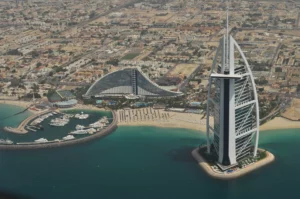
PetroDollar Paradigm Shift: Saudi Arabia in Talks to Join BRICS Bank
Breaking Boundaries: Saudi Arabia’s Potential Entry into the BRICS Bank Signals a PetroDollar Shift.

The Middle East’s political scene has recently undergone significant changes, with countries reevaluating their alliances. Traditionally aligned with the United States (US), many Arab nations are showing a shift in their foreign policies. Recent events, particularly the Saudi-Iranian agreement brokered by China, have caught global attention, raising concerns about US influence and Western values.
China’s involvement in facilitating the Saudi-Iranian agreement underscores its growing influence in the Middle East. The substantial bilateral trade volume, nearly $90 billion USD, establishes China as a key trading partner. Additionally, as Saudi Arabia’s primary oil purchaser, China’s economic ties with the Kingdom are strengthening. The introduction of China’s “Global Security Initiative” before the Saudi-Iranian deal signals a desire for increased strategic engagement, challenging Western values.
China’s rising influence in the Gulf region prompts concerns about its effects on US dominance. While high-level US officials continue visits to Saudi Arabia, China’s economic and political sway may affect Western companies and impact defense and security sectors. The US might reassess exporting cutting-edge weapon systems to the GCC, potentially leading to competition with Chinese defense organizations.
The recent Saudi-Iranian agreement may prompt a reduction in military expenditures within the Gulf Cooperation Council (GCC). Traditionally focused on countering the Iranian threat, defense procurements from the US could shift toward emerging economic priorities. This aligns with Saudi Arabia’s focus on economic development, as outlined in Crown Prince Mohammed bin Salman’s 2030 vision.
Another significant development is Egypt’s efforts to normalize relations with Iran. Ongoing talks and discussions of a potential meeting between the Egyptian Head of State and the Iranian leader signal a realignment of alliances. This shift may influence US allies in the region to move away from US and Israeli interests, particularly concerning the GCC’s normalization of relations.
The evolving dynamics in the Middle East have broader implications for the global geopolitical landscape. Increased involvement by China, Russia, and Iran poses a potential challenge to long-standing US influence. The growing diplomatic power and strategic influence of Saudi Arabia, the United Arab Emirates, and Egypt are shaping the region’s dynamics.
In conclusion, the political landscape of the Middle East is experiencing significant transformations, with nations reassessing their alliances and policies. China’s expanding influence, highlighted by the Saudi-Iranian agreement, has the potential to challenge US dominance and influence Western interests. Shifting defense expenditures, changing alliances in Egypt, and the readmission of Syria to the Arab League all contribute to the evolving geopolitical dynamics in the region. The repercussions of these changes extend beyond the Middle East, shaping the global geopolitical landscape. As these shifts unfold, it is crucial for nations in the Middle East to balance their national interests, manage conflicts, and prioritize cooperation to successfully navigate this evolving political landscape.

Breaking Boundaries: Saudi Arabia’s Potential Entry into the BRICS Bank Signals a PetroDollar Shift.

Morocco, a North African country, has been striving to strengthen its international position through development.

Discover the transformative impact of economic diversification on Middle East geopolitics, heralding a future of innovation, stability, and global engagement.